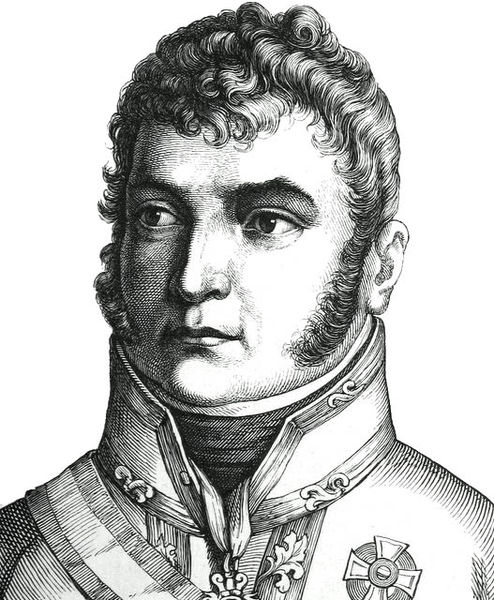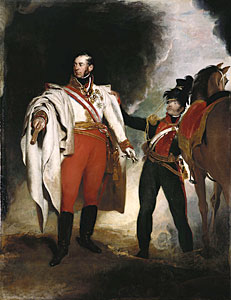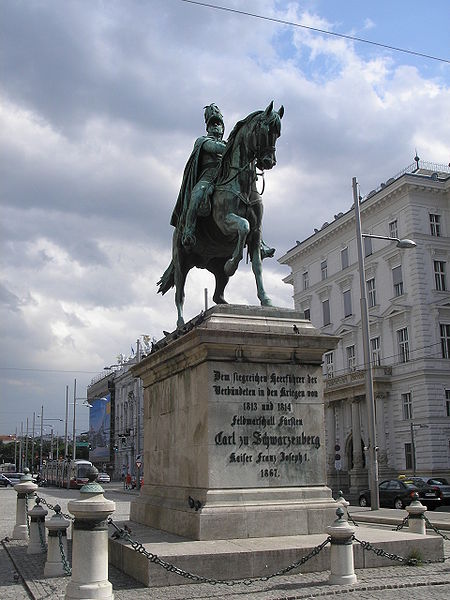<Back to Index>
- Chemist Paul Émile François Lecoq de Boisbaudran, 1838
- Composer Giacomo Carissimi, 1605
- Field Marshal Karl Philipp Fürst zu Schwarzenberg, 1771
PAGE SPONSOR



Karl Philipp Fürst zu Schwarzenberg (or Charles Philip, Prince of Schwarzenberg) (April 18, 1771 – October 15, 1820) was an Austrian field marshal.
Karl Philipp was born in Vienna as the son of Johann Nepomuk Anton of Schwarzenberg and Marie Eleonore Countess of Öttingen - Wallerstein.
He entered the imperial cavalry in 1788, fought in 1789 under Lacy and Loudon against the Turks, distinguished himself by his bravery, and became major in 1792. In the French campaign of 1793, he served in the advanced guard of the army commanded by Prince Josias of Coburg, and at Le Cateau - Cambrésis in 1794 his impetuous charge at the head of his regiment, vigorously supported by twelve British squadrons, broke a whole corps of the French, killed and wounded 3000 men, and brought off 32 of the enemy's guns. He was immediately decorated with the Knight's Cross of the Military Order of Maria Theresa.
After taking part in the battles of Amberg and Würzburg in 1796 he was raised to the rank of General - Major, and in 1799 he was promoted Feldmarschal - Leutnant. At the Battle of Hohenlinden he led a division in the right wing, and was almost the only Austrian general who emerged from that debacle with distinction. During
the retreat, his promptitude and courage saved the right wing of the
Austrian army from destruction, and he was afterwards entrusted by the Archduke Charles of Austria with the command of the rearguard. In 1804, Prince Karl Philipp was created Fürst zu Schwarzenberg in
a title identical to, but separate from, that of his brother, Joseph,
Prince of Schwarzenberg. In the war of 1805 he held command of a
division under Mack, and when Ulm was surrounded by Napoleon in October he was one of the brave band of cavalry, under the Archduke Ferdinand of Austria - Este,
which cut its way through the hostile lines. In the same year, he
received the Commander's Cross of the Order of Maria Theresa and in
1809 he was awarded the Order of the Golden Fleece. When in 1808, in view of a new war with France, Austria decided to send a special envoy to Russia, Schwarzenberg, who was persona grata at the Court of St Petersburg, was selected. He returned, however, in time to take part in the Battle of Wagram, leading a cavalry division in the Reserve Corps and
was soon afterwards promoted General of Cavalry. After the peace of
Vienna, he was sent to Paris to negotiate the marriage between Napoleon and the Archduchess Marie Louise of Austria.
The prince gave a ball in honour of the bride on 1 July 1810, which
ended in the death of many of the guests, including his own
sister-in-law, in a fire. Napoleon
held Schwarzenberg in great esteem, and it was at his request that the
prince took command of the Austrian auxiliary corps in the Russian campaign of 1812.
The part of the Austrians was well understood to be politically rather
than morally hostile, and Schwarzenberg gained some minor successes by
skilful manoeuvres without a great battle. Afterwards, under
instructions from Napoleon, he remained for some months inactive at Pułtusk. In 1813, when Austria, after many hesitations, took the side of the allies against Napoleon, Schwarzenberg, recently promoted to Feldmarschall, was appointed commander-in-chief of the allied Grand Army of Bohemia.
As such, he was the senior of the allied generals who conducted the
campaign of 1813 - 1814. Under his command, the Allied army was mauled by
Napoleon at the Battle of Dresden on 26 - 27 August and driven back into Bohemia. However, his army defeated pursuing French forces at the Battle of Kulm. Returning to the fray, he led the Allied army north again and played a major role in Napoleon's decisive defeat at the Battle of Leipzig on 16 - 18 October. During the invasion of France in 1814, he beat a French force at the Battle of Bar-sur-Aube in late February. He repelled an attack by Napoleon in the Battle of Arcis-sur-Aube on 20 - 21 March and overcame the last barrier before Paris by winning the Battle of Fère-Champenoise on March 25. His capture of the French capital on 31 March after the Battle of Paris resulted in the overthrow of Napoleon.
It
is the fashion to accuse Schwarzenberg of timidity and over-caution,
and his operations can easily be made to appear in that color when
contrasted with those of his principal subordinate, the fiery Blücher,
but critics often forget that Schwarzenberg was an Austrian general
first of all, that his army was practically the whole force that
Austria could put into the field in Central Europe, and was therefore
not lightly to be risked, and that the motives of his apparent
pusillanimity should be sought in the political archives of Vienna
rather than in the textbooks of strategical theory.
In any case his victory, however achieved, was as complete as Austria
desired, and his rewards were many, the Grand Crosses of the Order of
Maria Theresa and of many foreign orders, an estate, the position of
President of the Hofkriegsrath,
and, as a specially remarkable honor, the right to bear the arms of
Austria as an escutcheon of pretence. But shortly afterwards, having
lost his sister Caroline, to whom he was deeply attached, he fell ill. A stroke disabled him in 1817, and in 1820, when revisiting Leipzig, the scene of the Völkerschlacht that he had directed seven years before, he suffered a second stroke. He died there on the 15th of October.
His eldest son, Friedrich, Prince of Schwarzenberg (1800
- 70),
had an adventurous career as a soldier, and described his wanderings
and campaigns in several interesting works, of which the best known is
his Wanderungen eines Lanzknechtes (1844 - 1845). He took part as an Austrian officer in the campaigns of Galicia 1846, Italy 1848 and Hungary 1848, and as an amateur in the French conquest of Algeria, the Carlist Wars in
Spain and the Swiss civil war of the Sonderbund. He became a
major - general in the Austrian army in 1849, and died after many years
of well-filled leisure in 1870. The second son, Karl II Borromäus Philipp (1802 - 1858), was a Feldzeugmeister; the third, Edmund Leopold Friedrich (1803 - 73), a field marshal in the Austrian army. Of Schwarzenberg's nephews, Felix Schwarzenberg, the statesman, is separately noticed, and Friedrich Johann Josef Coelestin (1809
- 1885) was a cardinal and a prominent figure in papal and Austrian
history. His successors lived in Orlík castle in Bohemia, and after the creation of Czechoslovakia were its citizens, speaking Czech. The present head of the family, Karel VII Schwarzenberg (*1937), lived abroad (Swiss citizen)
during Czechoslovakia's communist period of 1948 - 1989. He supported Czechoslovakian political exiles and was president of the International Helsinki Federation for Human Rights in 1980s. He returned after the Velvet Revolution, was chancellor of President Václav Havel in 1990 - 1992, and was elected member of the Senate of the Czech Republic in 2004. Between 2007 and 2009, he served as the 6th Minister of the Foreign Affairs of the Czech Republic.